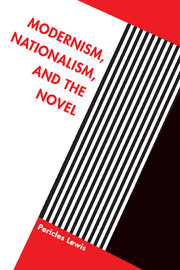Book contents
- Frontmatter
- Contents
- Acknowledgments
- Note on texts
- 1 The modern novelist as redeemer of the nation
- 2 The crisis of liberal nationalism
- 3 “His sympathies were in the right place”: Conrad and the discourse of national character
- 4 Citizens of the Plain: Proust and the discourse of national will
- 5 “Il vate nazionale”: D'Annunzio and the discourse of embodiment
- Conclusion
- Notes
- Select bibliography
- Index
4 - Citizens of the Plain: Proust and the discourse of national will
Published online by Cambridge University Press: 22 September 2009
- Frontmatter
- Contents
- Acknowledgments
- Note on texts
- 1 The modern novelist as redeemer of the nation
- 2 The crisis of liberal nationalism
- 3 “His sympathies were in the right place”: Conrad and the discourse of national character
- 4 Citizens of the Plain: Proust and the discourse of national will
- 5 “Il vate nazionale”: D'Annunzio and the discourse of embodiment
- Conclusion
- Notes
- Select bibliography
- Index
Summary
The most famous image of Marcel Proust seems the archetype of modernist isolation from political concerns – the neurotic novelist writing all night and sleeping all day in a cork-lined room, from which he attempts to exclude any sound or light that could distract him from remembering the intimate experiences of his youth. Proust's focus on the nuances of intimate relations, memory, and personal identity seems far removed from the problems of the nation-state. Despite his reclusiveness, however, Proust was not indifferent to politics: his most thorough statement of his aesthetic theory occurs in a political context and responds directly to the “relativism” of the nationalist Maurice Barrès. Towards the end of Le Temps retrouvé, the final book of A la recherche du temps perdu, the narrator discovers the principle of involuntary memory that will allow him to begin writing the novel he has long been planning. Through a series of sudden recollections, he finds that certain types of memories and certain sensations function as signs in his mind, that he must interpret them through his art, and that “the essential character [of these signs] was that I was not free to choose them, that such as they were they were given to me. And I realized that this must be the mark of their authenticity.”
- Type
- Chapter
- Information
- Modernism, Nationalism, and the Novel , pp. 126 - 174Publisher: Cambridge University PressPrint publication year: 2000



